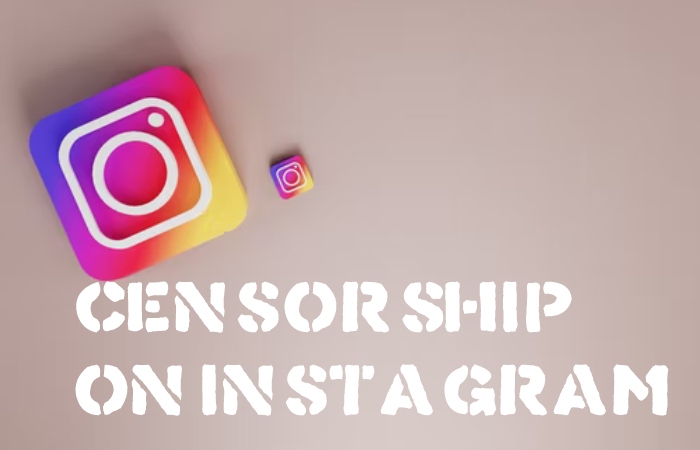When censorship in social networks is applied by the opinion of third parties and affects the user that is intend to be censor, the violation of policies remains in the background. Is this a severe problem in the social media sector?
Table of Contents
Censorship In Social Networks, Is It Really A Problem?
Lately, acts that can go against society are known, and censorship in social networks is becoming stronger. This can be a problem for users, and it is common for some users to focus on those acts that represent a mockery of morality.
Although adapting to the rules is mandatory, so are freedom of expression and free thought, although the latter is not very well perceive in social networks. Intolerance, unfortunately, is something that hundreds of people share.
Each platforms establishes some parameters and policies with which to have a balance, but it must also be recognized that, sometimes, it is difficult to establish the differences between abuse and right.
Censorship On Instagram

If a user does not break the established rules, it is not usual for the company to act individually against a user of the platform. Of course, with a report of an image, you will have an implacable control without really knowing whether or not there are substantiated arguments behind that complaint.
Are Celebrities Affected By Censorship On Social Networks?
These people are usually under the gaze of third parties, so censorship usually affects them a lot, even if it is not objective.
Censorship On Twitter
The platform of the little blue bird is perfect to make your way of thinking known. And, if you observe for a while the comments that arise after a publication, you will realize that the company hardly needs to take action, but it is the users themselves who make sure to say things in an appropriate way.
For this reason, the original question must be asked again: is censorship necessary in social networks? The answer is still yes. If controls are not administered from the platforms themselves, it will be easy to violate freedom of expression on the networks.
This highlights the limited capacity for understanding that exists in the citizens of the world. Society cannot ignore or digest content that is not to its liking.
For this motive, it is important to highlight the need for the education of all people in matters of responsibility. Before publishing, it is necessary to stop and think and respect free thought.
Is Censorship In Social Networks A Reality Or A Myth?
Censorship in social networks depends more on the taste of some users who stand up for morality than on the networks. For some time now, there has been a proliferation of the abuse of this right; the question is, what is pursue with it?
There are many reprehensible acts, but the most common are those directed at “false morality.” There is a crisis of values, but charging against anyone is already more popular than football. This sport is dangerous and violates the rights of other people, such as their freedom of expression.
Some networks and their policies warn of the use and content that you are allow and those that are not. Platforms like Instagram do not usually act on their initiative but after a user’s report.
Some content is allow and some isn’t, sometimes the rules apply and sometimes they don’t. But that should not depend on those ultra-defenders of morality, but should be agree upon. According to the social media platforms, they do not apply censorship on them, but they rely on very abstract rules to eliminate an image denounced.
With all this, it should be note that if you do not like what someone publishes, it is best not to follow it. And if something bothers you, you can block it. Applying this censorship is something more typical of the last century than of the 21st century.
Think Before You Post
With digital platforms you can market or sell any type of service or product or present your point of view about any circumstance. But we do not want to end this article without giving you a series of tips on what you should not share on your social networks.
First of all, do not get hot and think. One of the best and worst things about the Internet is that it is immediate. Form an opinion and then pour it out. Never do it the other way around. If you have a business, do not get involve in an argument with a client that is not going to take you anywhere good.
Be Respectful, Avoid Gossip And Attacks
If you are offensive on social networks you can unintentionally attack someone. A graphic image, a racist comment, a cruel joke, etc., can reduce your digital reputation, you will present yourself online as a disrespectful person and your credibility will fall to the ground.
Do not start gossip or launch attacks on a person. It may be that someone spoke badly to you or did the same about your services or products, but do not get into the rag. Directly attacking a person is a mistake, because the relationship will be broken at that moment, if that person is a client, you will lose him forever. In fact, not only will you lose him, but any prospect who sees that comment will likely lose interest in starting a business relationship with you.
Respect all people and do not damage the audience’s trust in you. Take care of each of your comments, and do not speak ill of your bosses, superiors, employees or co-workers; that is not professional, nor will it bring you anything good.
More Things You Should Not Part On Your Social Networks
Do not attribute third-party content to yourself and post it as your own. This is valid for images, texts, quotes or anything else that you can plagiarize, and it is not honest. If the person wants to protect her rights, you can be involve in litigation for something silly. Copyrights are protect, and such a lawsuit would seriously damage your reputation and trademark.
European legislation has gotten to work on this and, since January 2019. You have to be more careful than ever about reproducing material that is not your property. To avoid this type of situation, cite your sources, and, in this way, you will never lose your copyright.
Do not share details about your trips. If you have a personal brand or use the company account as your own, it can generate engagement to say where you are going on vacation or when. But never reveal the exact dates of your trips or place the location. Save all those images and share them once you have returned home.
The Personal Should Be Private
If someone has written you a private message or email, they have done so because they don’t want it to be public. Before disclosing it, you should ask for permission and ask if you can make it public on your social networks.
It is fashionable to take screenshots of a WhatsApp conversation and post it, but remember that you need to have written permission from that person. Thus, you will protect both your brand and yourself.
When you read in a blog that you must be authentic and. Real or that you have to show yourself as you are. It does not mean that you publish your whole life in the media. The balance is just the right measure. And find it between what is specific to your industry, what is informative and some small personal things.
On the other hand, it is beyond any doubt that financial information is a private field. But it is worth reminding you that this data must be protect. For their part, businesses must also have a plot of privacy in terms of financial information. Do not publish forecasts of income. Payments or profits. The advice is to think twice before publishing it. You don’t know who can see it or what its intention is.
A Formula For Success
Now that you know everything you should not share on social networks and how you should not behave. So as not to apply or be censor. You should know that if you want to be successful in all your publications on online platforms. You must have good content.
Nobody opens a social network to see something that scares them or that they find boring. To impress your followers, share and make videos that are not offensive, but funny, and show them interesting things. These two premises will increase your engagement.
Complement all your posts with links and other visual elements, as this way their reach will be greater. Do not share negative or vindictive content. Share positive content and if you have a business. Think about your brand image and reputation.
In short, censorship in social networks depends almost more on the followers than on the platforms themselves. To avoid censorship. Think about what you would not like to see published about you on social networks before making each post.


